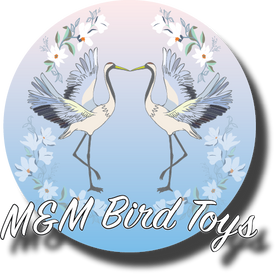Weaning is when a baby parrot is gradually weaned off of food given to it by its parents or formula given to it by a breeder and weaned on to solid foods. This process takes place both in the wild and in captivity and is very important for a parrots healthy development. Weaning helps pets develop self sufficiency, confidence and a positive curiosity surrounding objects and food. Weaning can be done by anyone but its recommended to leave it to breeders who have the experience, equipment, know-how and time to successfully wean birds.

These cockatiel chicks are hungry!
In the wild baby chicks, right after hatching, are immediately conditioned by their parents to beg for food. At this stage the parents train the chicks to master their begging skills through positive reinforcement by feeding them. Gradually the parents feed the chick less and less forcing it to become self-sufficient. The parents will continually nudge the chick to explore its surroundings, take its first flight, learn where food is, how to discover new food sources, how to avoid dangers and many other important life lessons.

Hand-rearing baby parrots is considerable work and a huge time investment.
If a chick is being raised by a breeder the process of hand-feeding, caring and weaning are very time intensive activities. This is a stressful process for both the bird and the breeder, requiring planning, an experienced eye and patience on the breeders part. Birds typically being to wean around 5-12 weeks old with larger pets weaning a little later and smaller pets weaning a little earlier. About three weeks before weaning begins, breeders will place low-walled bowls in the brooder area (the chicks enclosure) to introduce the bird to new foods. Cereals and unsweetened food stuffs are great weaning items. The chick may only at first play with the new food items but even this introduces texture, color and taste. As brooders are moist the breeder must constantly change the food to prevent it from spoiling. During this the breeder will feed the chick with formula, gradually reducing the amount. The breeder will monitor the chicks weight closely as birds can lose 10-15% of their body weight as they wean. The first meal thats typically stopped is the midday hand-feeding. After the chick adjusts to this change the next meal thats stopped is the morning meal. During the day solid foods like seed, pellets and fresh foods are offered to entice the chick to eat. Typically in the evening some formula is given so that the chick can comfortably sleep. This process is recommended for those with experience and with the time needed to monitor and care for chicks around the clock.

A beautiful baby African Grey parrot.
In the past it was assumed that an owner needed to hand-feed the bird in order to solidify the bond between and owner and parrot. Even though this is still repeated its been proven to be mostly untrue. This is very beneficial for bird owners as purchasing a weaned chick is much easier to begin caring for when compared to purchasing an unweaned chick. The American Federation of Aviculture (AFA) has published their position on weaning in eight points:
- AFA recognizes that tragic results are likely to occur when unweaned baby birds are placed with those invidivuals who lack the necessary skills.
- AFA recognizes that successful hand-rearing involves a multitude of skills and that there is no substitute for experience.
- AFA finds the transfer of unweaned baby birds to parties unable to provide proper care is a problem of undocumented and unknown magnitude.
- AFA finds there is no practical way to determine or define qualifications indicating that a particular party is not able to provide proper care for an unweaned baby bird.
- AFA finds the issue of whether or not an individual is able to provide proper care in a particular hand-rearing situation to be a matter of personal responsibility between the parties involved in the transfer of the bird or birds.
- The AFA opposes the transfer of unweaned baby birds to parties unable to provide proper care.
- AFA opposes any legislative or regulator intrusion on issues of personal responsibility surrounding the transfer of unweaned baby birds by attempting to define or quality who can or cannot provide proper care or hand-feeding.
- AFA therefore opposes any legislation or regulator limitations on the sale of unweaned baby birds.
Works Cited:

